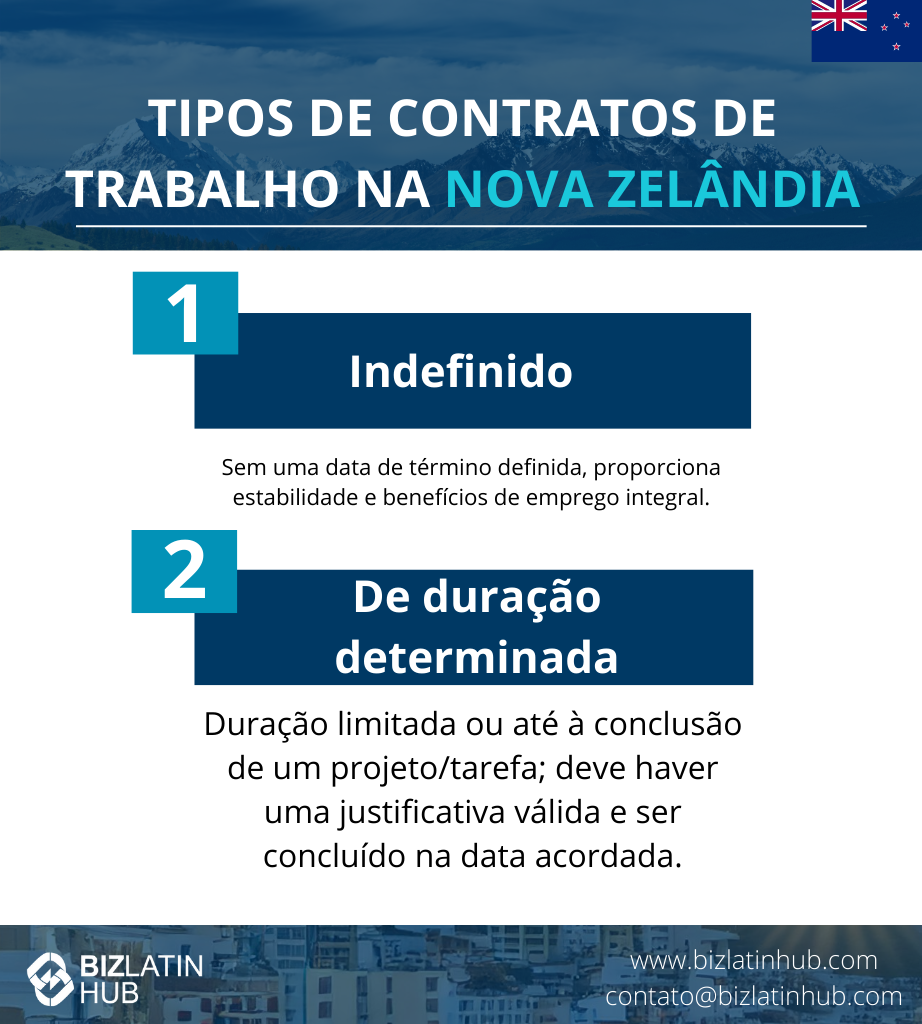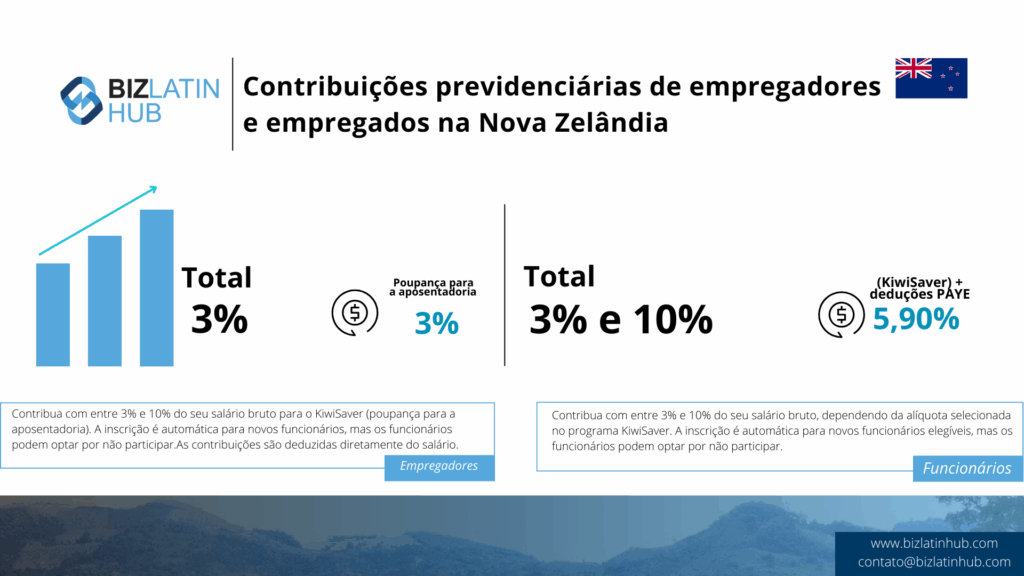Como a terceira economia mais livre do mundo, a Nova Zelândia é um ambiente atraente para a constituição de uma empresa. O pequeno país recebe grandes somas de investimento estrangeiro direto, comércio global e tem sua parcela justa de acordos de livre comércio. Considerando todas essas características atraentes da economia, não é de se admirar que tantos investidores e empresários estrangeiros estejam buscando contratar funcionários na Nova Zelândia. Este guia detalha os requisitos essenciais para os empregadores de acordo com a Lei de Relações Trabalhistas de 2000, desde contratos e remuneração até poupança para aposentadoria e resolução de disputas.
Principais conclusões: Leis trabalhistas da Nova Zelândia
| Os contratos orais são legais na Nova Zelândia? | Não, um contrato de trabalho por escrito é obrigatório para todos os funcionários. |
| Quais são as obrigações do empregador para o plano de aposentadoria KiwiSaver? | Um número igual deve ser pago ao esquema KiwiSaver como uma porcentagem do salário bruto do funcionário. Você pode chegar a 10%. |
| Que tipos de licenças existem na Nova Zelândia? | Há quatro tipos de licença a que todos os funcionários têm direito. |
| O que é um período de avaliação de 90 dias e quando ele pode ser usado? | O salário mínimo para adultos na Nova Zelândia é de NZ$ 23,15 por hora a partir de janeiro de 2025. Isso equivale a NZ$ 926 por semana. |
| O que é uma queixa pessoal? | Uma queixa pessoal é uma reclamação formal que um funcionário pode fazer contra seu empregador se acreditar que foi tratado injustamente ou que seu contrato de trabalho foi violado. O motivo mais comum é a demissão injustificada. |
Principais obrigações do empregador na Nova Zelândia
Antes de se mudar para a jurisdição, é importante que as empresas entendam os direitos e as responsabilidades trabalhistas de empregadores e empregados na Nova Zelândia. A seguir, você encontrará alguns aspectos que os proprietários de empresas estrangeiras devem conhecer em relação à cultura de trabalho local:
- Horas de trabalho – O dia de trabalho padrão na Nova Zelândia é de oito horas, com uma semana de trabalho padrão de até 40 horas.
- Feriados públicos – Há 11 feriados públicos na Nova Zelândia a cada ano.
- Tempo de férias – Os trabalhadores da Nova Zelândia têm direito a quatro semanas de férias por ano. Os pais cuidadores primários têm direito a 26 semanas de licença.
- Tipos de contrato – Existem basicamente dois tipos de contrato na Nova Zelândia: emprego por tempo indeterminado e emprego por tempo determinado
1. Forneça um contrato de trabalho por escrito
Todo funcionário deve ter um contrato de trabalho por escrito. Pode ser um contrato individual ou um contrato coletivo. Ele deve conter determinadas cláusulas obrigatórias.
Dica de especialista: A cláusula do período de teste de 90 dias
De acordo com nossa experiência, o período de teste de 90 dias é uma ferramenta poderosa para os empregadores, mas é frequentemente implementado de forma incorreta. Para que o período de experiência seja legalmente válido, ele deve atender a duas condições rigorosas: 1) o empregador deve ter 19 ou menos funcionários no momento da contratação e 2) a cláusula do período de experiência deve ser incluída em um contrato de trabalho por escrito assinado por ambas as partes antes de o funcionário começar a trabalhar.
Aconselhamos os clientes a finalizar e assinar o contrato bem antes da data de início, pois um funcionário que começa a trabalhar mesmo um dia antes da assinatura não está legalmente em um período de experiência, o que remove a proteção do empregador contra uma reclamação pessoal por demissão.
2. Cumprir o pagamento mínimo e os direitos de licença
Os empregadores devem pagar pelo menos o salário mínimo atual e fornecer aos funcionários seus direitos mínimos de licença anual, por doença e por luto, bem como dias de folga pagos em feriados públicos.
3. Gerenciar o KiwiSaver e as contribuições da folha de pagamento
Os empregadores devem lidar com deduções na folha de pagamento para o imposto de renda Pay As You Earn (PAYE) e fazer contribuições obrigatórias do empregador para o esquema de aposentadoria KiwiSaver para funcionários contribuintes.
4. Seguir os procedimentos para demissão e queixas pessoais
O empregador deve ter um motivo legalmente válido e seguir um processo justo para demitir um funcionário. Se isso não for feito, você poderá entrar com uma ação de reclamação pessoal.
A Lei de Relações Trabalhistas de 2018

Política e negócios na Nova Zelândia Você pode ver que a equipe de trabalho está tentando trabalhar em conjunto nos últimos três anos. Em termos de direito trabalhista e negócios, a mudança legislativa mais recente feita pela equipe foi a Lei de Relações Trabalhistas de 2018. Estabelecidas em 2018, essas novas leis estão agora em pleno vigor.
Além das mudanças feitas em termos de regulamentação sindical, conforme mencionado acima, a lei também melhora a justiça e a segurança dos funcionários no local de trabalho. Em geral, as maiores mudanças na lei são as seguintes:
- Estabelecer intervalos para descanso e refeições
- Períodos de teste limitados de 90 dias para empresas com 19 ou menos funcionários
- Reintegração de funcionários demitidos sem justa causa
- Restabelecer proteções e regulamentações para funcionários vulneráveis do setor
- Fortalece a negociação coletiva e os direitos sindicais
O Grupo de Trabalho Conjunto
Embora tenha sido estabelecida há quase 50 anos, a Lei de Igualdade Salarial de 1972 da Nova Zelândia está recebendo mais atenção agora do que nunca. Isso ocorre depois que as diferenças salariais entre os gêneros chegaram a incríveis 16% em 1998, e ainda permaneciam em torno de 13% em 2016. Como resultado, o governo criou o Joint Working Group on Pay Equity Principles (JWG) em 2015.
Como uma organização governamental, o JWG desenvolve e propõe ideias e recomendações legislativas. O ideal é que essas mudanças diminuam a discrepância salarial entre os gêneros na Nova Zelândia. Em um futuro próximo, o governo espera fazer alterações na Lei de Igualdade Salarial de 1972, bem como na Lei de Relações de Trabalho, para incluir um protocolo para reivindicações de igualdade salarial. Também se fala em exigir que os empregadores publiquem dados sobre as estatísticas de diferenças salariais entre funcionários do sexo masculino e feminino. Isso tornará o assunto em questão mais transparente.
Benefícios para empregadores que estão contratando funcionários na Nova Zelândia
Embora existam novas leis a serem cumpridas, os empregadores também têm a ganhar com essas mudanças. Normalmente, os funcionários em condições de trabalho mais seguras e amigáveis tendem a ser mais felizes e engajados. Como resultado, os funcionários que estão felizes no local de trabalho são 20% mais produtivos do que aqueles que não estão, portanto, sua empresa será beneficiada. Por exemplo, a Noruega tem leis trabalhistas semelhantes em vigor e está em segundo lugar no mundo em termos de felicidade e satisfação dos funcionários. O país também tem o oitavo maior PIB per capita do mundo.
Quanto custa contratar pessoas na Nova Zelândia

O custo de contratação na Nova Zelândia é menor do que em nações mais ricas, mas os trabalhadores geralmente são bem qualificados e especializados. Com investimentos significativos em educação ao longo de vários anos, a Nova Zelândia agora tem um excesso de graduados no mercado de trabalho para os quais não pode oferecer empregos locais. Isso significa que o mercado de trabalho na Nova Zelândia é relativamente competitivo para um possível empregador que está chegando.
O salário mínimo na Nova Zelândia é de NZ$ 926 por semana para um adulto. Entretanto, essa não é necessariamente a taxa que você deve oferecer. Nos principais setores que exigem trabalhadores qualificados e especializados, você precisará oferecer pelo menos a taxa padrão do mercado. Um especialista local em contratação na Nova Zelândia será de grande valia para garantir que você não esteja pagando a mais ou oferecendo taxas pouco atraentes que dificultem o recrutamento de talentos de qualidade.
A função da Autoridade de Relações Trabalhistas (ERA)
A Employment Relations Authority (ERA) é um órgão governamental independente que ajuda a resolver problemas de relacionamento empregatício. Ela investiga e toma decisões sobre disputas que empregadores e empregados não conseguem resolver sozinhos, incluindo reclamações de queixas pessoais ou salários não pagos.
Duas opções para contratação: estabelecer uma empresa ou PEO
Ao entrar no mercado e contratar na Nova Zelândia, há basicamente duas opções disponíveis para investidores e empreendedores. A maneira mais comum de fazer isso é por meio da formação de uma empresa completa para estabelecer uma presença na jurisdição. No entanto, isso pode exigir tempo e esforço, o que significa que vale a pena considerar também outra opção, usando uma Organização Profissional de Empregadores (PEO).
PEO: rápido e ágil
Uma Professional Employer Organization (PEO), também conhecida como “Registered Employer” ou “Employer of Record”, é uma organização que fornece e apoia as empresas em suas funções de recursos humanos, desde os estágios iniciais de recrutamento até o pagamento de impostos e benefícios. Os PEOs assumem as tarefas fundamentais e demoradas das equipes de recursos humanos, permitindo que as empresas se concentrem no crescimento e no sucesso de seus negócios.
Os serviços de um PEO são particularmente úteis quando as empresas buscam contratar uma força de trabalho local, mas não desejam estabelecer uma entidade legal local. Simplificando, o PEO facilita a contratação de pessoal na Nova Zelândia por meio de um provedor terceirizado. Isso significa que você pode entrar no mercado e começar a contratar rapidamente, sem ter que se comprometer com a entrada total até ter certeza de que é isso que deseja fazer. Vale a pena observar que, regionalmente, está começando a haver mais regulamentação e o PEO na Nova Zelândia pode não ser viável no futuro.
A opção de longo prazo: contratação direta
Esse é o padrão ouro de contratação na Nova Zelândia, pois lhe dará controle total sobre seus funcionários, além da certeza de que você estará em conformidade a longo prazo. Isso também lhe dá um status mais elevado com possíveis candidatos a emprego, que verão você como um empregador mais seguro a longo prazo.
Antes de começar a contratar funcionários na Nova Zelândia, você precisará primeiro ter uma noção da estrutura legal, financeira e cultural do país. Por exemplo, você terá que lidar com a burocracia associada à incorporação e gerenciar a folha de pagamento. Com uma presença legal permanente na Nova Zelândia, você será totalmente responsável pela conformidade com a legislação local.
Um especialista local ajudará você a contratar na Nova Zelândia, pois ele terá uma ampla rede de profissionais qualificados para os melhores cargos, bem como uma boa ideia do mercado de trabalho local. Eles poderão aconselhar sobre as melhores tarifas a serem oferecidas e o tipo de perfil que você deve ter como alvo. Como a legislação antidiscriminação é importante na Nova Zelândia, especialmente para empregos de alto nível, eles podem garantir que você faça uma oferta justa que esteja em conformidade com a legislação local.
Depois de publicar os anúncios e receber as inscrições, você deve passar a entrevistar os possíveis candidatos. Isso deve ser feito, no mínimo, por um gerente de equipe e por um representante de RH, para garantir que tudo esteja em ordem em termos legais. Talvez você queira incluir outras pessoas no processo para fazer uma melhor avaliação do candidato.
É perfeitamente possível que você deseje fazer uma segunda entrevista, possivelmente envolvendo outros membros da equipe, conforme discutido acima. Também é comum na região e ao contratar na Nova Zelândia fornecer aos candidatos uma tarefa de aptidão a ser concluída. Essa tarefa geralmente tem a forma de uma tarefa fictícia que simula o tipo de trabalho que será feito no futuro e confirma que você possui as habilidades citadas em seu currículo.
Por fim, o consultor local poderá ajudar você nas etapas do processo de contratação e de integração. Ele garantirá que você cumpra os requisitos padrão, como exames médicos obrigatórios, e garantirá que qualquer período de experiência esteja dentro dos limites estabelecidos pela legislação trabalhista da Nova Zelândia. Geralmente, esse período é de três meses.
Quatro setores-chave na Nova Zelândia
O setor agrícola é o pão e a manteiga de sua economia local e de exportação, atraindo um alto grau de investimento estrangeiro na Nova Zelândia. Apesar de seu tamanho, a nação das Ilhas do Pacífico é a maior exportadora de laticínios do mundo. Isso é centralizado pelo principal negociante de laticínios do país, o Fonterra Co-operative Group. Além disso, as exportações de carne vermelha do país estão crescendo rapidamente.
A construção está respondendo a um boom populacional nas áreas urbanas da Nova Zelândia. O movimento de pessoas e a imigração para os centros de negócios e estilo de vida da Nova Zelândia pressionaram a disponibilidade de moradias. Em particular, a cidade de Auckland está passando por uma crise habitacional que o governo está se esforçando para resolver. Especialistas do setor preveem que será necessário construir mais 15.000 casas por ano para acompanhar o crescimento.
Um dos mais promissores na lista de histórias de sucesso econômico da Nova Zelândia é o setor de serviços em rápido desenvolvimento do país. Esse setor representa cerca de 70% do PIB do país, sendo o transporte e a logística o maior setor. Diz-se que as empresas locais estão gastando, em média, cerca de 40% a mais em serviços do que em salários e vencimentos.
A Nova Zelândia sustenta um imenso setor de turismo, divulgando suas paisagens pitorescas e diversas experiências de aventura. É o maior setor de exportação do país no que diz respeito a ganhos em moeda estrangeira. A receita do turismo representou 6,1% do PIB nacional, totalizando US$ 15,9 bilhões. O setor emprega 8% da população da Nova Zelândia. Esse crescimento recorde é atribuído em grande parte ao crescente fluxo de turistas chineses abastados.
Qual é a importância dos sindicatos na Nova Zelândia?
A formação e a cultura em torno dos sindicatos na Nova Zelândia são fortes. É importante que você saiba que os sindicatos são uma parte importante da vida e dos direitos dos funcionários no país. Leis recentes alteraram as regulamentações sobre sindicatos e empregadores. Mais notavelmente, essas mudanças vêm da Lei de Relações de Trabalho de 2018. Essas mudanças incluem, entre outras, as seguintes:
- Prazos de início mais curtos para sindicatos em negociações coletivas
- Os empregadores não podem deduzir o salário por greves parciais
- Os representantes do sindicato podem entrar nos locais de trabalho sem consentimento em algumas circunstâncias
- O formulário prescrito para que os novos funcionários indiquem se pretendem se filiar a um sindicato
- Tempo remunerado razoável para delegados sindicais
- Proteções aos funcionários contra discriminação por filiação a sindicatos
De modo geral, os sindicatos da Nova Zelândia são altamente ativos sob o governo atual. É fundamental que qualquer empresa que esteja se estabelecendo na Nova Zelândia compreenda a evolução das regulamentações que envolvem os sindicatos. Eles desempenham um papel importante no clima e na funcionalidade da economia do país.

Perguntas frequentes sobre a contratação de funcionários na Nova Zelândia
Em nossa experiência, essas são as perguntas comuns que recebemos de clientes que desejam contratar na Nova Zelândia.
A legislação trabalhista da Nova Zelândia garante que tanto os empregadores quanto os empregados tenham direitos e responsabilidades. Os empregadores são obrigados a tratar os funcionários de forma justa, fornecer a eles pelo menos o salário mínimo exigido pelo governo e cumprir outras obrigações da legislação trabalhista. Além disso, os empregadores devem garantir um ambiente de trabalho seguro para seus funcionários.
Na Nova Zelândia, não há um requisito mínimo definido para o número de horas em um dia de trabalho padrão. No entanto, é comum que funcionários em tempo integral trabalhem entre 7,5 e 8 horas por dia. É importante que o número de horas trabalhadas por um funcionário, independentemente de exceder ou ficar abaixo de 40 horas por semana, seja especificado no contrato de trabalho.
O salário mínimo na Nova Zelândia é de NZ$ 23,15 por hora para adultos, NZ$ 18,16 por hora para trabalhadores iniciantes e NZ$ 18,16 por hora para trabalhadores em treinamento.
O pagamento de horas extras na Nova Zelândia não é obrigatório por lei, portanto, os empregadores não são obrigados a pagar aos funcionários mais do que sua taxa regular. No entanto, alguns contratos podem especificar que os funcionários receberão hora-e-meio por horas extras até um determinado número de horas em um dia específico, e o dobro do tempo por qualquer hora extra adicional no mesmo dia.
Para demitir um funcionário na Nova Zelândia, o empregador deve ter um motivo válido para a demissão, como má conduta repetida, problemas relacionados ao desempenho ou incapacidade. O procedimento aceito normalmente envolve uma advertência oral, seguida de uma advertência formal por escrito, uma advertência final por escrito e, se necessário, a demissão. Em casos de má conduta séria ou grave, o empregador pode demitir o funcionário sem aviso prévio.
O KiwiSaver é um esquema de poupança para aposentadoria voluntário e baseado no trabalho. Os empregadores são obrigados a registrar automaticamente os novos funcionários elegíveis e devem contribuir com um mínimo de 3% do salário bruto do funcionário, caso ele opte por contribuir.
Todos os funcionários têm direito a quatro tipos principais de férias: férias anuais (quatro semanas por ano), licença médica (dez dias por ano), licença por luto e feriados (dias de folga pagos).
Uma queixa pessoal é uma reclamação formal que um funcionário pode fazer contra seu empregador se acreditar que foi tratado injustamente ou que seu contrato de trabalho foi violado. O motivo mais comum é a demissão injustificada.
O Biz Latin Hub pode ajudar você a contratar funcionários na Nova Zelândia
Leis trabalhistas, investimentos estrangeiros e formação de empresas em mercados estrangeiros podem parecer assustadores. Com o excesso de leis, regulamentações, exceções à regra e políticas em constante mudança, pode ser difícil navegar pela expansão e/ou estabelecimento de sua empresa.
É para isso que a Biz Latin Hub está aqui! Com experiência em serviços de back office e representação comercial no exterior, podemos ajudar você e sua empresa a entrar em mercados estrangeiros em todo o mundo. Se você está intrigado com as oportunidades de negócios que esperam por você na Nova Zelândia, entre em contato conosco aqui com interesse e/ou dúvidas.






